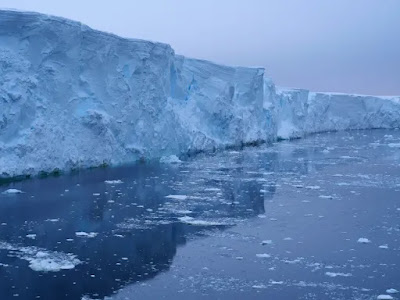 |
| A part of Thwaites Glacier in Antarctica, which has been the focus of a lot of study, with worry about climate- induced sea level rise. Photo from British Antarctic Survey |
Luckily, the Thwaites Glacier, as it's known, might not be so scary after all. At least not yet. And it is still at least a little frightening to climate scientists.
"The research suggested that a catastrophic collapse of the glacier, which could lead to rapid and drastic sea-level rise, is less likely to occur this century than previously thought.
The Thwaites Glacier in West Antarctica - about the size of Florida - has been a major focus for climate scientists due to its unstable nature and significant contribution to sea level rise.
Currently, it accounts for about 4 percent of the annual increase in sea levels and holds enough ice to raise them by over two feet if it fully melts, according to the International Thwaites Glacier Collaboration."
Marine ice cliff instability or MICI is when ice shelves collapse, they expose big ice cliffs that often collapse from their own weight, causing a chain reaction of rapid glacier retreat, says Newsweek.
Scientists have studied MICI in theoretical settings and climate models but never in real world situations. Until now. Newsweek continues:
"Using updated computer simulations, the Dartmouth team found that MICI is unlikely to occur this century at Thwaites. Even if the glacier's entire ice shelf were to collapse today, the resulting ice cliffs would likely not be tall enough to crumble and trigger the catastrophic chain reaction previously feared."
This study contradicts what scientists were saying even just several months ago, that the Thwaites was headed toward imminent collapse.
That's not to say this thing is perfectly safe. First of all if it were to collapse, the two foot sea level rise wouldn't be the end of it. The glacier acts as sort of a giant dam, holding back huge sections of the Antarctic ice sheet. If Thwaites went away, much of that ice sheet would flow into the ocean, eventually raising sea levels by ten feet.
Which wouldn't be good if you live in a low lying coastal city. Like Miami, for instance.
As recently as September, scientists said comparatively warm sea water was infiltrating beneath the base of the glacier, accelerating melting on its bottom. That would help accelerate its rate of melting, so that's not good.
Even if Thwaites were no big deal, we're not safe from sea level rise.
It's still going up due to climate change. Sea levels are going up by about 0.13 inches per year. That doesn't sound like much, but it makes a big difference after a few decades, especially in highly developed, flat and sinking coastal regions.
Plus, the pace of sea level rise is starting to increase.

No comments:
Post a Comment